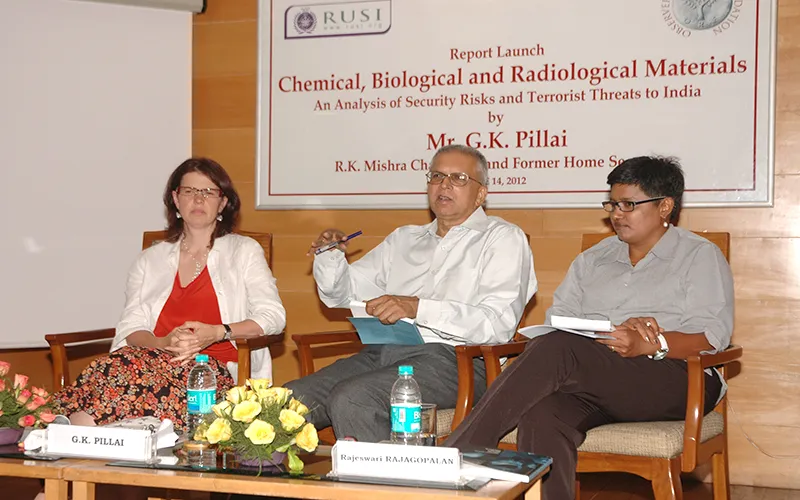-
CENTRES
Progammes & Centres
Location
A research study by Observer Research Foundation (ORF) and Royal United Services Institute (RUSI) has found that there is a clear danger to India from CBR (Chemical, Biological and Radiological Materials) terrorism due to the known intentions of terrorist groups active within India's borders.

A research study by Observer Research Foundation (ORF) and Royal United Services Institute (RUSI) has found that there is a clear danger to India from CBR (Chemical, Biological and Radiological Materials) terrorism due to the known intentions of terrorist groups active within India’s borders.
Terrorist organisations may seek to carry out CBR attacks in future by detonating a radiological dispersal device ("dirty bomb’); by carrying out an armed assault on an industrial facility handling CBR materials or on vehicles transporting material between sites; or by infiltrating facilities in order to steal CBR materials or to sabotage the site, the study has warned.
The study found that site security at facilities and industries handling CBR materials is variable. Large industrial sites, particularly under the protection of the Government-funded Central Industrial Security Force (CISF), are well-protected with robust security and safety arrangements, but this is not mirrored in all medium- and small-scale facilities, some of whom have employed private security agencies who are not adequately trained.
In such a scenario, the study suggested greater standardisation of site security with well-developed practical plans for implementation. The study has been published, titled "CHEMICAL, BIOLOGICAL AND RADIOLOGICAL MATERIALS: An Analysis of Security Risks and Terrorist Threats to India.
The study found that transport of CBR materials presented particular vulnerabilities as the majority of regulation focused on transport accidents, not on deliberate attack. Protection of CBR materials in transit needs to be strengthened, the study suggested.
The study also suggested that CBR training and awareness needs to be pushed out to frontline staff in security agencies and industry in order to ensure that the threats are both fully understood and that any observed incidents are recorded correctly.
Another important suggestion is to give an increased role to the National Disaster Management Authority in prevention and mitigation of CBR incidents, as well as the response to such events.
The report noted that the threat of CBR terrorism is a global security concern with past incidents such as the deliberate contamination of food by the Rajneeshee religious cult in Oregon, USA in 1984 and the release of a chemical agent by the Aum Shinrikyo cult on the Tokyo subway in March 1995. These incidents showed that deliberate attacks are within the capabilities of malicious actors and can have devastating consequences.
In addition, industrial accidents such as the Bhopal gas tragedy in India in 1984, mishandling of dangerous radiological material such as the accidental sale of radioactive Cobalt-60 to a scrap dealer in Delhi in 2010, and the intentional poisoning of the Kaiga Atomic Power Station water supply in Karnataka in 2009 showed the damage that could be caused by malicious actors using CBR materials. Such incidents also highlight security and safety vulnerabilities surrounding CBR materials and the sites on which they are stored and used.
Since India faces a serious battle against terrorism from armed Naxal rebels, insurgent and separatist groups such as United Liberation Force of Assam (ULFA), and other international terrorist groups such as Lashkar-e-Taiba (LeT) and Jaish-e-Mohammad (JeM), CBR threats needs to be taken care of more seriously, the report said.
Click here for the complete report
The views expressed above belong to the author(s). ORF research and analyses now available on Telegram! Click here to access our curated content — blogs, longforms and interviews.